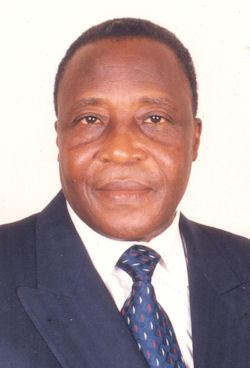Robert Guei - 1999-2000
 On 24 December 1999 General Robert Guéï (of the Yacouba minority, a sub-group of the Mandé) seized power in a bloodless military coup - Côte d'Ivoire's first. Following the coup, General Guei formed a government of national unity and promised open elections. Guéï promoted his predecessor's xenophobic notion of ‘Ivoirité', enshrining it in a new constitution. A new constitution was drafted and ratified by the population in the summer of 2000. Elections were scheduled for fall 2000, but the general's handpicked Supreme Court disqualified all of the candidates from the two major parties -- the PDCI and Rassemblement des Republicaines (RDR) on the basis that candidates must have two Ivorian parents and never have held citizenship with another country. This meant that Alassane Ouattara, head of the Rassemblement des Republicaines (RPR) and perhaps the leading candidate, could not stand. Ouattara, a Muslim from the north of the country (unlike all previous leaders, who were Christians from the south), had served in Houphouet-Boigny governments – he was Prime Minister, 1990-93 – but his parentage was not considered to be sufficiently pure Ivorian. Western election support was withdrawn, along with election monitors.
On 24 December 1999 General Robert Guéï (of the Yacouba minority, a sub-group of the Mandé) seized power in a bloodless military coup - Côte d'Ivoire's first. Following the coup, General Guei formed a government of national unity and promised open elections. Guéï promoted his predecessor's xenophobic notion of ‘Ivoirité', enshrining it in a new constitution. A new constitution was drafted and ratified by the population in the summer of 2000. Elections were scheduled for fall 2000, but the general's handpicked Supreme Court disqualified all of the candidates from the two major parties -- the PDCI and Rassemblement des Republicaines (RDR) on the basis that candidates must have two Ivorian parents and never have held citizenship with another country. This meant that Alassane Ouattara, head of the Rassemblement des Republicaines (RPR) and perhaps the leading candidate, could not stand. Ouattara, a Muslim from the north of the country (unlike all previous leaders, who were Christians from the south), had served in Houphouet-Boigny governments – he was Prime Minister, 1990-93 – but his parentage was not considered to be sufficiently pure Ivorian. Western election support was withdrawn, along with election monitors.
His lone opponent was Laurent Gbagbo, (of the Bété minority, a sub-group of the Krou - concentrated in the south-west), the leader of the Front Populaire Ivoirien (FPI). The RDR called for a boycott, setting the stage for low election turnout in a race between Guei and Front Populaire Ivoirien (FPI) candidate Laurent Gbagbo. When early polling results showed Gbagbo in the lead, Guei stopped the process - claiming polling fraud - disbanded the election commission, and declared himself the winner. Within hours Gbagbo supporters took to the streets of Abidjan. A bloody fight followed as crowds attacked the guards protecting the presidential palace. Many gendarmes and soldiers joined the fight against the junta government, forcing Guei to flee. Having gained the most votes, Gbagbo was declared President.
When Gbagbo was declared President, the RPR protested, on the grounds that their candidate had been wrongfully disqualified from standing. Alassane Ouattara called for new elections. Laurent Gbagbo refused and embraced the concept of ‘Ivoirité'. The RDR then took to the streets, calling for new elections because the Supreme Court had declared their presidential candidate and all the candidates of the PDCI ineligible. Gbagbo's supporters, backed by the southern-dominated military, turned on northerners, killing scores of them. More violence erupted as forces loyal to the new government joined the FPI youth to attack RDR demonstrators. Hundreds were killed in the few days that followed before RDR party leader Alassane Ouattara called for peace and recognized the Gbagbo presidency but the north-south divide had deepened. But the period left another lesson, which is that street violence, particularly in Abidjan, could be politically powerful.
Tensions continued and northern army units mutinied in September 2002. Robert Guéï, who had returned to the country, was killed at the outset in unclear circumstances and amid government claims of his involvement
|
NEWSLETTER
|
| Join the GlobalSecurity.org mailing list |
|
|
|

